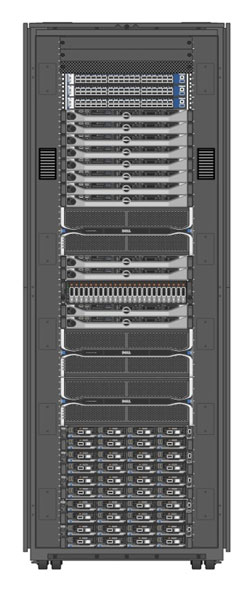Kuala Lumpur (4 July 2016) — Dell has announced advancements to its high performance computing (HPC) portfolio, including the availability of new Dell HPC Systems and technology partner collaborations for early access to innovative HPC technologies.
“While traditional HPC has been critical to research programs that enable scientific and societal advancement, Dell is mainstreaming these capabilities to support enterprises of all sizes as they seek a competitive advantage in an ever increasing digital world,” said William Tan, head of Enterprise Solutions, Dell Malaysia. “As a clear leader in HPC, Dell now offers customers highly flexible, precision built HPC systems for multiple vertical industries based upon years of experience powering the world’s most advanced academic and research institutions. With Dell HPC Systems, our customers can deploy HPC systems more quickly and cost effectively and accelerate their speed of innovation to deliver both breakthroughs and business results.”
Dell HPC Systems Portfolio Simplifies Powerful, Traditional HPC System for Enterprises of All Sizes
Available in Malaysia and globally, the Dell HPC Systems portfolio is a family of HPC and data analytics solutions that combine the flexibility of customised HPC systems with the speed, simplicity and reliability of pre-configured systems. Dell engineers and domain experts designed and tuned the new systems for specific science, manufacturing and analytics workloads with fully tested and validated building block systems, backed by a single point of hardware support and additional service options across the solution lifecycle.
With simplified configuration and ordering, organisations can more quickly select and deploy updated Dell HPC Systems at any scale today. As an Intel® Scalable System Framework® configuration, these systems, available today, include the latest Intel® Xeon® processor families, support for Intel® Omni-Path Architecture (Intel® OPA) fabric, and software in the Dell HPC Lustre Storage and Dell HPC NFS Storage solutions:
- Dell HPC System for Life Sciences – Designed to meet the needs of life sciences organisations, this enables bioinformatics and genomics centers to deliver results and identify treatments in clinically relevant timeframes while maintaining compliance and protecting confidential data.
- Dell HPC System for Manufacturing –Enables manufacturing and engineering customers to run complex design simulations, including structural analysis and computational fluid dynamics.
- Dell HPC System for Research – Enables research centers to quickly develop HPC systems that match the unique needs of a wide variety of workloads, involving complex scientific analysis.
Dell Leads HPC Technology Advancements with Industry Partners to Help Accelerate Customer Innovation Cycles
Dell has instituted a customer early access program for early development and testing in preparation for Dell’s next server offering in the HPC solutions portfolio, the Dell PowerEdge C6320p server, which will be available in the second half of 2016, with the Intel® Xeon Phi™ processor (formerly code-named Knights Landing). The PowerEdge C6320p unique server engineering and design will enable customers to:
- Gain insights faster with a modular building block design, engineered to deliver faster insights for data-intensive computations and scale-up parallel processing.
- Accelerate performance in dense and highly parallel HPC environments with 72 cores that are specifically optimised for parallel computing.
- Simplify and automate systems management with the integrated Dell Remote Access Controller 8 (iDRAC8) with Lifecycle Controller. Customers can deploy, monitor and update PowerEdge C6320p servers faster and ensure higher levels of service and availability.
The Texas Advanced Computing Center (TACC) at The University of Texas at Austin has partnered with Dell and Intel to deploy an upgrade to its Stampede supercomputing cluster with Intel Xeon Phi processors and Intel OPA via Dell’s early access program. Stampede, one of the main clusters for the Extreme Science and Engineering Discovery Environment (XSEDE),is a multi-use, cyberinfrastructure resource offering large memory, large data transfer, and GPU capabilities for data-intensive, accelerated or visualisation computing for thousands of projects ranging from cancer cure research to severe weather modeling.
This month, the U.S. National Science Foundation awarded US$30 million to TACC to acquire and deploy Stampede 2 as a strategic national resource to provide HPC capabilities for thousands of researchers in the U.S. The new Dell HPC System is expected to deliver a peak performance of up to 18 petaflops, more than twice the system performance of the current Stampede system. Three and a half years since its installation, Stampede ranks as the 12th most powerful supercomputer in the world, according to the June 2016 TOP500 list.
Additionally, Dell continues to bring HPC capabilities to mainstream enterprises through a series of evolving solutions and services designed to deliver a range of HPC-as-a-Service capabilities, giving HPC sites a choice of local or remote management services with deployment on-premise, off-premise or a hybrid of the two.
For more information, visit www.dell.com.my.

